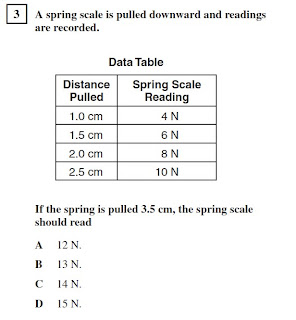I call it Make it Right but I'm sure it goes by other names. The instructions are simple. After selecting the correct answer the students need to rewrite the question so that the other choices now become correct. Example:
After selecting A as the right answer, they then redraw the problem three times to make the answer correct for B, C, and D.
This year, with my spanking new whiteboards, I'll just assign each kid a letter and have him/her take that letter for every question (Student 1 is responsible for all the A responses, Student 2 for all the B responses, etc). We can quarter the whiteboards and have the kids share around their four-person group.
Sometimes it gets a little weird like in this one:
There really isn't a situation (at least that would ever come up in our level of science) where anything but C would be correct. In this case I just ask them to justify why A, B, and D can't ever be the correct answer.
My only other guide is that they should keep the spirit of the question intact. Thus for:
I want them to try to adjust the numbers in the table, rather than, for example, write an F=ma problem where the answer is 13 N.
Even for the plug and chug questions, this exercise takes a good amount of understanding and number sense. I don't feel bad about doing it and when asked I can say that I've been test prepping so it's a win-win.
Any other test prep suggestions are welcome.
Disclaimer - I'm not a big believer in test prep, but my school is. We're a "persistently low-achieving school" according to various governing bodies so I don't fault them for feeling the squeeze. One of the things the higher ups in my district think might be helpful (editor's note:no comment) is to print out a copy of the released test questions [pdf] for every CST a student will be taking. So every 8th grader has 4 packets (math, ELA, science, social studies) crammed into the bottom of his or her backpack. Since my school spends 4 digits on these copies (editor's note:again, no comment) I feel I should use them somehow. They could have at least thrown me a bone by removing the multiple choice answers but alas......


